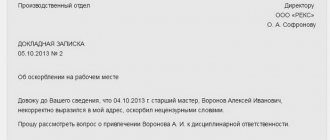A threat reflects the most evil and serious intentions. For certain types of threats, an aggressive person can be punished under Article 119 of the Criminal Code of the Russian Federation.
As the article
5.61 of the Code of Administrative Offenses of the Russian Federation, “
insult
, that is, humiliation of the honor and dignity of another person, expressed in an indecent form” entails the imposition of an administrative fine on citizens - from 1 to 3 thousand rubles, on officials - from 10 to 30 thousand, on legal entities - from 50 to 100 thousand rubles.
The Criminal Code of the Russian Federation provides for an article for threats, as well as liability for humiliating and frightening promises. Definition of “Threat of death or harm to health” - current article 119
of the Criminal Code of the Russian Federation, which implies serious punishment. Article for threats and insults The witness was the father of another classmate. My child was shocked.
What can be considered an insult
The main reason for opening a criminal case with prosecution is the commission of any offensive act or action against a police officer, be it a written insult or verbal insult. The option of committing it does not affect the fact of a criminal act in the form of an insult.
Criteria and facts that determine the objectivity of an unlawful act in the form of insulting a law enforcement officer:
- employee's position;
- the specific nature of the offensive behavior;
- the date and place of the insult committed against a representative of the State Traffic Inspectorate is also a violation, since he is an official in the government structure and also belongs to the class of police officers (thus, if the driver refuses to comply with the requirements of the traffic inspector, then he should transfer information about this to the traffic police service or higher authorities)
To determine the severity of the crime committed, the assessment of the offensive act is taken into account, determined using such subjective factors as intent, motive, circumstances of the insult and confirmation of guilt. For example, if a citizen insulted a police officer because he extorted a bribe or used other methods of pressure, then the penalty will be significantly mitigated or not applied at all.
What is the penalty for insulting a police officer?
The seriousness of the violation lies in the destruction of the authority not of any specific officer, but of the entire law enforcement agency for its inability to deal with such incidents in violation of order. Therefore, it requires the application of certain penalties in relation to the violator.
For insulting police officers, the attacker must be subject to criminal liability, which provides for the following sanctions:
- payment of a fine in the amount of 40 thousand rubles;
- correctional and forced labor for 1 year;
- deprivation of wages for a period of one to three months;
- compulsory work up to 360 hours;
- In addition to all of the above, punishment for insulting the personality of a police officer in the performance of his official duty provides for a ban on holding certain positions and management positions.
Depending on the seriousness and depth of the insult, the above measures can be combined with each other, so the punishment may be more or less severe. For example, a violator may be subject to penalties in the form of a monetary fine and mandatory work in the amount of 360 hours.
When making a decision, the presence of both mitigating and aggravating factors of the commission of an unlawful act, regarding the honor and dignity of the police officer, can be taken into account. However, regardless of the depth of the offensive actions, such behavior will lead to the imposition of penalties, so your dissatisfaction must be expressed in a purely correct form.
Corpus delicti
Article 119 of the Criminal Code extends its effect to cases when
- the threat of murder or subsequent infliction of serious harm to your health was not made in a state of psychological arousal;
- the victim has good reason to believe that the attacker may actually carry it out;
- the attacker had a firearm or bladed weapon with which he planned to carry out the threat.
Punishment for a crime may occur if, during a domestic quarrel, the attacker demonstrated direct intent to commit a crime. In a domestic conflict, such a phrase, not supported by any other threatening actions, may not be a significant circumstance for initiating a criminal case.
Important!
Every subject who has reached the age of 16 and does not have psychological disabilities must be held accountable by law for their words . This article of the Criminal Code always has an objective side to the crime, which lies in the direct intent to commit the offense.
What to do if you are insulted
Even though the law has become less harsh towards those who like harsh statements, this does not mean that you need to tolerate inappropriate behavior towards you. If someone humiliated you, insulted you, or expressed offensive words with a personal touch, then you have every right to contact the police and write a statement.
This is also important to know:
Types of liability for vandalism and its difference from hooliganism
It will be more effective if, in addition to the statement, you also have evidence. Confirmation of the fact of insult can be:
- witness statements;
- any recording, audio or video, for example from a mobile phone;
- threatening messages.
If the conflict happened in a private conversation, you can find witnesses who will confirm your depressed state after the incident or have seen your quarrels with the offender before. This will increase the chances of the case being resolved in your favor.
With a good lawyer, in addition to fines, the offending party can receive compensation for moral damages.
It will be useful to find out how much noise you can make in your apartment if your neighbors are very noisy and do not respond to requests for silence.
How to prove a violation
To initiate a criminal case, it is enough to identify the presence of elements of a crime. But the article for insulting a person in the performance of official duties is applied by court verdict. To bring the guilty person to justice, the prosecutor must prove the following facts:
- The victim is a representative of the authorities. This will confirm the contract or employment agreement.
- The accused understood that he was insulting a person in authority. If the victim did not introduce himself, did not show identification, or did not wear uniform, then the intent is questioned. Evidence includes the testimony of the accused, witnesses, audio and video recordings.
- At least one person was present during the incident. This refers to an outsider who is not associated with the authority that the victim represents. It acts as a witness.
- The statement or action is expressed obscenely or violates moral standards. If necessary, this will be confirmed or refuted by linguistic examination.
If at least one of the circumstances cannot be proven, then the act will be classified differently. For example, an article for insulting a civil servant in the performance of official duties, who does not have administrative powers by virtue of the law, will be not criminal, but administrative.
ConsultantPlus experts analyzed what insulting authorities on the Internet is and what the consequences are for it. Use these instructions for free.
24.08.: 13758
Responsibility of minors for obscene language
The problem of obscene language is especially acute in adolescence, because older children associate it with independence, with disobedience to prohibitions, and in general, swearing is a symbol of adulthood. This is also a tribute to speech fashion, and imitation of idols.
Abuse and rudeness hide weakness and vulnerability, which are unacceptable among young people. In addition, by swearing, high school students try to confirm their emotional independence from adults.
From the history
Teenagers often claim that swearing is a kind of Slavic tradition. This is wrong. Until about the middle of the 19th century, bad words were not used even in villages; it was a criminal offense.
During the reign of Alexei Mikhailovich Romanov - the father of Peter I - for the use of obscene words, according to the Council Code, severe punishment was imposed - up to and including the death penalty.
Obscene language
The laws do not have a definition or list of obscene words. The police and prosecutor's office determine what words people should limit. Roskomnadzor monitors swearing in the media, and the Federal Antimonopoly Service monitors obscenities in advertising.
Punishment for obscene language of minors
Obscene language in a public place is regarded by law and moral standards as a manifestation of clear disrespect for other people.
Public use of obscene expressions is equated to petty hooliganism, liability for which is provided for in Article 20.1 of the Code of Administrative Offenses of the Russian Federation and entails an administrative fine in the amount of 500 to 1 thousand rubles or administrative arrest for up to 15 days.
A person who has reached the age of sixteen at the time of committing an administrative offense is subject to administrative liability (Article 2.3 of the Code of Administrative Offenses of the Russian Federation).
Responsibility for administrative offenses committed by minors aged 14 to 16 years lies with parents or other legal representatives (guardians, trustees).
The key point in qualifying an offense as petty hooliganism is the citizen’s intent to disrupt public order and express clear disrespect for society.
Internet
The Internet is a public place, but not public. Sites themselves set penalties for foul language. The maximum punishment for swearing can be a permanent ban. But it’s still not worth using foul language in comments on registered media websites.
Insult
Insult, that is, humiliation of the honor and dignity of another person, expressed in an indecent form, entails the imposition of an administrative fine on citizens in the amount of 1,000 to 3,000 rubles. Liability is provided for in Article 5.61 of the Code of the Russian Federation on Administrative Offences.
Persons over 16 years of age are subject to administrative liability for insult. If the offender is 16 years old but under 18, the case will be reviewed by a juvenile commission, which often exempts minors from administrative liability. They are subject to measures of influence that are not punitive in nature, for example: warning, transfer to parental supervision. The law does not allow a person under the age of 16 to be held administratively liable.
However, this does not mean that citizens insulted on a social network do not have the means and mechanisms to restore their violated rights - they can go to court to demand compensation for moral damage caused.
So, if a teenager who has offended someone on a social network has not reached the age of 14, their parents or guardians will be responsible for their actions.
But young people aged 14 to 18 years, according to Art. 1074 of the Civil Code of the Russian Federation, they are already independently responsible for the harm caused. True, if their independent income is absent or insufficient to compensate for the harm, then the parents of the offender are also obliged to compensate for the harm in full or in the missing part.
In January of this year, in Turinsk, Sverdlovsk region, parents paid 100 thousand for children who insulted a teacher. The students edited the teacher’s photo and posted it on social networks. The teacher did not like the result and went to court.
If the parents had not paid the fine, the children would have had to do so after reaching adulthood.
Number of impressions: 13758 Date modified: 08/24/2021 17:00:36
How to prove the existence of threats or intimidation of a citizen?
Article 119 of the Criminal Code of the Russian Federation provides for punishment if the fact of the threat is officially proven by the presence of witness testimony or recorded using other sources of information, including electronic ones. How to prove the fact of intimidation is the main problem that sometimes prevents the possibility of punishment for the crime committed. Among the implemented methods of threats, the possibilities of their proof can be divided into the following:
- uttering a threat in person - you can attach a video recording or invite witnesses who can confirm the fact of uttering threatening words;
- threats to life through a telephone conversation - you will need to provide a printout of the conversation taken from the telephone company;
- printouts of conversations from social networks, or sent to you via email.
Important!
Evidence that will help establish responsibility for intimidation can include a handwritten reference from a third party or testimony that will help to find out the truth.
Forms of insult
Let us clarify all the forms that insult can take (130, Criminal Code of the Russian Federation):
- verbal;
- written form;
- physical actions.
Spitting, slapping and other single blows, indecent gestures and other offensive body movements are considered physical actions. It is noteworthy that in domestic criminal legislation (Article 130 of the Criminal Code of the Russian Federation) physical actions have never been directly equated with an insult, but they cannot be written off: in their meaning, spitting in the face and indecent gestures represent a negative assessment of the victim’s personality.
conclusions
Is insult a crime (Article 130 of the Criminal Code of the Russian Federation)? The answer is clear: no longer. Has the public benefited from the abolition of such articles of the Criminal Code as “Slander” and “Insult”? Not yet known. Articles of the same name migrated to the Code of Administrative Offenses, and “Slander” completely disappeared after the adoption of Federal Law No. 141-FZ of July 28, 2012. Insulting is now punishable by a simple administrative fine and does not entail a criminal record.
The future will show how much these changes contribute to law and order.
Objective side
In order to study the theory, let’s imagine that the aforementioned Article 130 of the Criminal Code of the Russian Federation is still in effect, and we will consider in more detail the objective side of the crime called “Insult”. These are actions consisting of a negative assessment of the victim’s personality, and such an assessment humiliates the honor and dignity of a person. The insult can take place both in front of strangers and in private with the victim. Moreover, it can be carried out in absentia, for example, through a written message.
To recognize any statement as an insult, the form of feedback about the identity of the victim must be indecent. What does it mean? An indecent assessment inevitably contradicts the rules of interpersonal communication and violates generally accepted norms of morality and ethics. As a result of indecent treatment of the victim, an unlawful humiliation of honor and dignity occurs. It is not necessary, however, to express the insult to the victim’s face: it can be expressed to third parties, provided that what was said is conveyed to the victim.
It is necessary to distinguish insult from slander. Slander does not correspond to reality, while insult (essentially a negative assessment expressed out loud, expressed in action or recorded on paper) can be completely consistent with reality. This aspect is not particularly important for qualifying a crime; What matters is an indecent form of feedback that harms the honor and dignity of the offended person.
What is the offense
Article 319 of the Criminal Code of the Russian Federation does not specify what insult in the performance of official duties is, but only contains specific signs of the act.
Therefore, one should focus on the norms of Article 5.61 of the Code of Administrative Offenses of the Russian Federation. These are actions or statements aimed at humiliating the dignity and honor of the addressee. Based on the combination of these two legal norms, to qualify a crime, the following conditions must be met:
- the addressee is a representative of the government;
- he was in the performance of official functions;
- he was humiliated in an indecent or anti-moral manner by touching upon the topic of his professional activities;
- the act was public.
At the same time, a threat to an official in the performance of official duties does not correspond to the elements of this crime. It is punishable under Article 318 of the Criminal Code of the Russian Federation and is actually equated to the use of harmless violence against a government official.
How to prosecute for personal insult?
Let us examine in detail the procedure for bringing to justice for insults on the Internet, at work, etc. in 2022. At the moment of insult, a person should remain calm. Under no circumstances should you insult the offender in response, since then bringing him to justice will be more difficult or even impossible. You should contact government agencies immediately, this will make it much easier to prove the fact of humiliation and insult. In order for authorized persons to accept the case for consideration, the victim must submit a written application, drawn up in accordance with the requirements of the law.
The application is written in an official business style; it should not have any blots or corrections. The application must indicate: the name of the body to which it is submitted; information about the victim and the offender; description of the moment the offense was committed; description of the consequences resulting from the violation of rights guaranteed by law; list of requirements. Also, the application must indicate the date of its submission and the signature of the victim. A sample application can be obtained from the office of a government agency. All available evidence should be attached to the application (copies should be attached, only if necessary, provide the originals), since without them it will be very difficult to prove the guilt of the offender. Anything can be used as evidence: screenshots of insults on social networks, video or audio recordings of verbal insults, photographs, witness statements, expert opinions, etc. The main thing is that the evidence meets these 3 requirements :
- Relevance. The evidence must be relevant to the particular case.
- Acceptability. All evidence must be obtained only in a legal manner, otherwise it is not taken into account when considering the case.
- Credibility. Evidence must not be fake. There is criminal liability for providing counterfeits and misleading authorized persons.
In addition to evidence, you must attach a copy of your identification documents (passport) to your application. Since without them a written request will not be accepted. The application is submitted to the office of the government agency; if there are errors in the design or other shortcomings, it will be returned for revision. If no errors were identified, then the application is accepted and a stamp of the institution is placed on one of its copies, or a coupon is issued indicating the date of acceptance. The applicant must have either one copy of the application or a coupon. Since if no measures are taken by government officials, the applicant will be able to file a complaint with a higher authority about the inaction. Since they are obliged to consider the case and take action within the period prescribed by law. The government agency employee must notify the applicant about the results of the investigation and the measures taken.
Unfortunately, almost every person has encountered such a phenomenon as insult. Many are even accustomed to being insulted and humiliated and simply do not react to it. However, as long as people allow their rights to be violated, this will continue. It is possible to reduce the level of such offenses only if every person shows an active civic position and does not ignore insults, humiliation and other violations of his rights.
Video on the topic:
Conditions for bringing to responsibility
A citizen who insults a police officer is held accountable if the law enforcement officer was directly performing his official duties to maintain order in the area entrusted to him. If a citizen insults a law enforcement officer during his non-working hours, for example, on a day off, then such a measure of punishment cannot be applied.
In addition, there are a number of other conditions under which you can be held accountable under Article 319 of the Criminal Code of the Russian Federation :
- the age of the person who insulted the police officer must be over 16 years;
- a crime committed must have witnesses. According to the legislation of 2022, an insult is regarded as public if it is intentionally carried out by a person in the presence of other citizens and is motivated by the desire to disrupt the normal activities of a police officer, affecting his authority before citizens and his colleagues as a law enforcement officer;
- the insult is committed directly while the employee is performing his official duties or in connection with their performance, that is, a crime occurs only when the policeman carries out activities to protect public order, and the insults prevent him from performing his official duty;
- the insult is presented in an obscene form, which includes obscene expressions, gestures towards a police officer and other options that contradict social and moral rules of behavior (for example, a slap on the head, a derogatory nickname, etc.);
- there must be intent and motive, that is, there must be evidence that the offender insulted the employee intentionally and far from a constructive comment on his activities, but guided solely by emotional motives (spite, anger, feelings of revenge);
- intentionality or unintentionality of committing an unlawful act. Often, offensive actions towards police officers are noted by citizens who did not have clear intentions or motives for insults, as they were in a state of alcoholic or psychotropic intoxication;
- verbal or written insult (a citizen verbally expressing everything he thinks directly to a law enforcement officer, or in the form of a note or publication in the media).
In the case where an unlawful act regarding the violation of the honor and dignity of a police officer in the performance of his official duties goes beyond all the conditions described above, then it is regarded as a crime against the person. For example, when an employee, while on vacation, hears obscene expressions or swearing addressed to him, then for such actions the person is brought to administrative responsibility with a fine of 1 to 3 thousand rubles.
Who is considered a representative of the authorities?
The mentioned article for insulting a person in the performance of official duties does not provide an answer to it. But it is in another - 318 of the Criminal Code of the Russian Federation. She includes in the considered category of potential victims:
- persons performing the functions of representatives of law enforcement agencies (police officers, prosecutors, investigators, bailiffs, customs officers);
- persons representing regulatory authorities (Federal Tax Service, Rostechnadzor, Rospotrebnadzor, labor inspection, etc.);
- other persons who have administrative powers by force of law (city mayors, regional governors).
IMPORTANT!
For comparison: humiliation or threat in the performance of official duties against a doctor, teacher or any other ordinary public sector employee is not a criminal offense.








